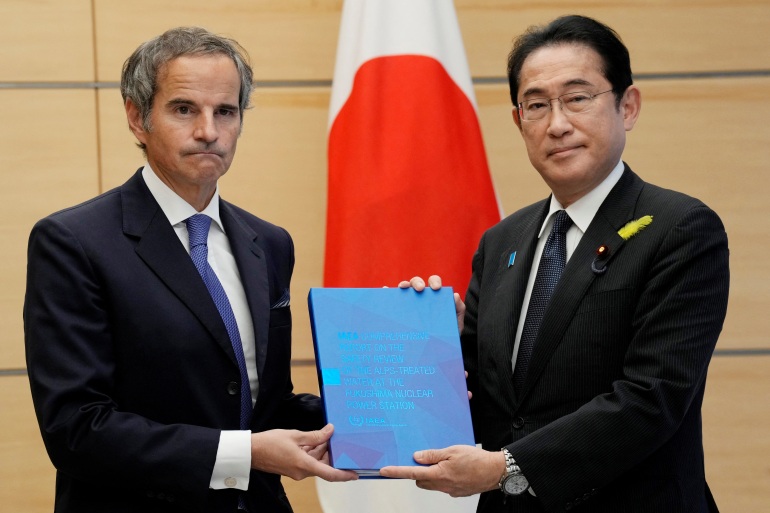The plan to release treated water into the Pacific Ocean over several decades won IAEA approval on Tuesday.
The Japanese government could start releasing treated but still radioactive water from the ruined Fukushima Daiichi nuclear power plant into the Pacific Ocean as soon as next month, after the United Nations nuclear watchdog gave the green light to the controversial plan after a two year review.
The Nikkei newspaper reported Wednesday that Japanese officials will soon explain the plan to the local community and neighboring towns amid concerns over the impact of the release of the water, which is currently stored in more than 1,000 giant tanks around the power plant site. .
The director general of the International Atomic Energy Agency (IAEA), Rafael Grossi, said on Tuesday that the agency’s biennial safety review concluded that the plan was consistent with relevant international safety standards [and] controlled and gradual discharges of treated water into the sea would have a negligible radiological impact on people and the environment.
Grossi is expected to travel to the Fukushima site on Wednesday with Japanese Prime Minister Fumio Kishida.
More than 1.3 million tons of water enough to fill 500 Olympic-size swimming pools has accumulated at the plant since the March 2011 tsunami destroyed the plant’s electricity and cooling systems and triggered the world’s worst nuclear disaster since the time of Chernobyl.
Most of the water comes from the cooling of the three damaged reactors, and an extensive pumping and filtering system known as the Advanced Liquid Processing System (ALPS) draws out tons of freshly contaminated water every day, filtering out most of the radioactive elements.
However, the plan to release the water, first announced in April 2021, has met fierce resistance from Japan’s neighbors and Pacific island nations, as well as fishing and farming communities in and around Fukushima. who fear for their livelihood.
Rushed release
Much of the concern centers on the presence of tritium, a radioactive isotope of hydrogen, which is difficult to remove from water.
The IAEA said that prior to the dumping, Japan would dilute the water to bring the tritium level below regulatory standards and that the UN supervisory body would maintain a continuous presence on site and provide a real-time online monitoring on its website from the exhaust facility once the release starts.
The process is expected to last several decades.
Grossi is expected to travel to South Korea after leaving Japan on Friday, as well as New Zealand and the Cook Islands.
Beijing has been among the loudest critics of the water dump plan. In a statement following the IAEA report, China’s foreign ministry chastised the agency’s rushed release of the report, arguing that it did not fully reflect the views of the experts who participated in the review. He didn’t elaborate.
We once again urge the Japanese side to halt its ocean dumping plan and seriously dispose of nuclear-contaminated water scientifically, safely and transparently, the statement said. If Japan insists on going ahead with the plan, it will have to bear all the consequences that come with it.
South Korea, meanwhile, has said that while it complies with the IAEA report, its priority would remain the health and safety of our people, Yonhap news agency said, citing an official in President Yoon’s office. Suk-yeol.
Seoul, which banned all seafood imports from Japan’s eight prefectures near Fukushima in 2013 over radiation concerns, also said it would undertake an unprecedented inspection of food products over the next 100 days to ensure that importers, distributors and resellers correctly mark the origin of the goods.
#Japan #controversial #Fukushima #water #release #month
Image Source : www.aljazeera.com

